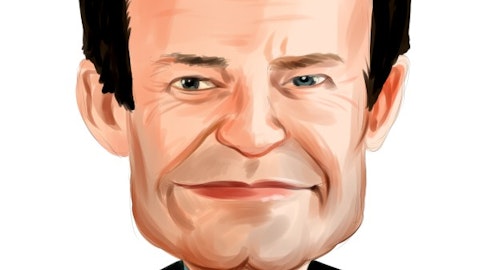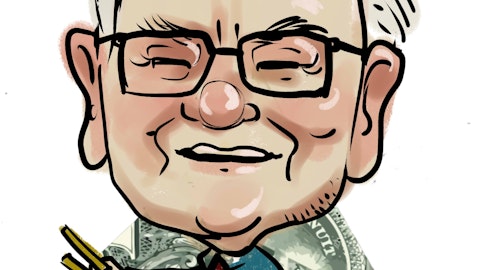
Hedge funds that we track generally didn’t make as big investments in Starbucks this quarter. The largest position in Starbucks from a filer other than Fisher Asset Management was the 3.6 million shares reported by Columbus Circle Investors, and this number was actually down 18% from the previous quarter after the fund had sold shares in the first three months of the year as well (see more activity at Columbus Circle Investors). John Lykouretzos’s Hoplite Capital Management and Michael Lowenstein’s Kensico Capital each reported about 2.4 million shares in their portfolios, which were very small increases from the end of March.
Starbucks’s third fiscal quarter, which ended July 1 2012, was characterized by a 13% increase in revenue compared to the third fiscal quarter of 2011. Macro watchers have been worried about American consumers cutting back spending, and one common theme has been a derisive warning that consumers would stop “spending $5 for a cup of coffee” but the Americas segment reported 7% same-store sales growth nevertheless. Same-store sales rose even more- 12%- in China/Asia-Pacific. Net income increased 19% as many fixed costs were held in check. Over the first three quarters of the year, Starbucks has grown its revenues 15%- yes, that double-digit revenue increase last quarter represents a slowdown- and its net income has risen 16% compared to the same period in 2011.
So Starbucks is a valuable, growing business. The catch is that it already carries a premium valuation. The trailing price-to-earnings ratio is 27, and forward earnings estimates of 20% EPS growth over the course of 2013 imply a P/E of 23. We’re impressed by the company’s growth but are wary of counting on that growth rate to increase next year, and note that the pricing seems a bit high even if Starbucks is able to execute. The PEG of 1.5 doesn’t make it look cheap either, and of course that figure is also derived from what may be optimistic analyst projections.
Starbucks is best compared to a collection of companies which are each exposed to some of the same factors: Green Mountain Coffee Roasters (NASDAQ:GMCR), which while retail-focused depends on demand for coffee; Dunkin Brands (NASDAQ:DNKN), which sells quite a bit of coffee and hot beverages in its lower-end stores; McDonalds (NYSE:MCD), whose bread and butter is hamburgers but has tried to improve its coffee to capture some of Starbucks’s market share; and Panera Bread (NASDAQ:PNRA), which has much of the same combination of standardized and ubiquitous as its fellow specialty eatery. On a forward basis, the short target Green Mountain Coffee Roasters has the lowest forward earnings multiple at 10, followed by McDonalds, Dunkin, and finally Panera at a P/E of 22, just below Starbucks’s. With a trailing earnings multiple of 30, Panera looks quite a bit like Starbucks on a quantitative basis, though given its smaller size its high earnings growth (24% last quarter over the same period a year ago) is probably more sustainable. For years Starbucks has been lampooned as a company whose locations are within spitting distance of each other, while Panera can both increase its U.S. locations and capitalize on same-store growth. Starbucks does trump both Dunkin and McDonalds in terms of recent growth, though over the longer term sell-side analysts believe Dunkin will be successful in taking its concept national. We don’t particularly like any of these stocks, but Panera seems to have a better chance of hitting its growth targets than Starbucks and McDonalds, at a trailing P/E of 17 and paying a 3.2% dividend yield, would be the best value of the five.




